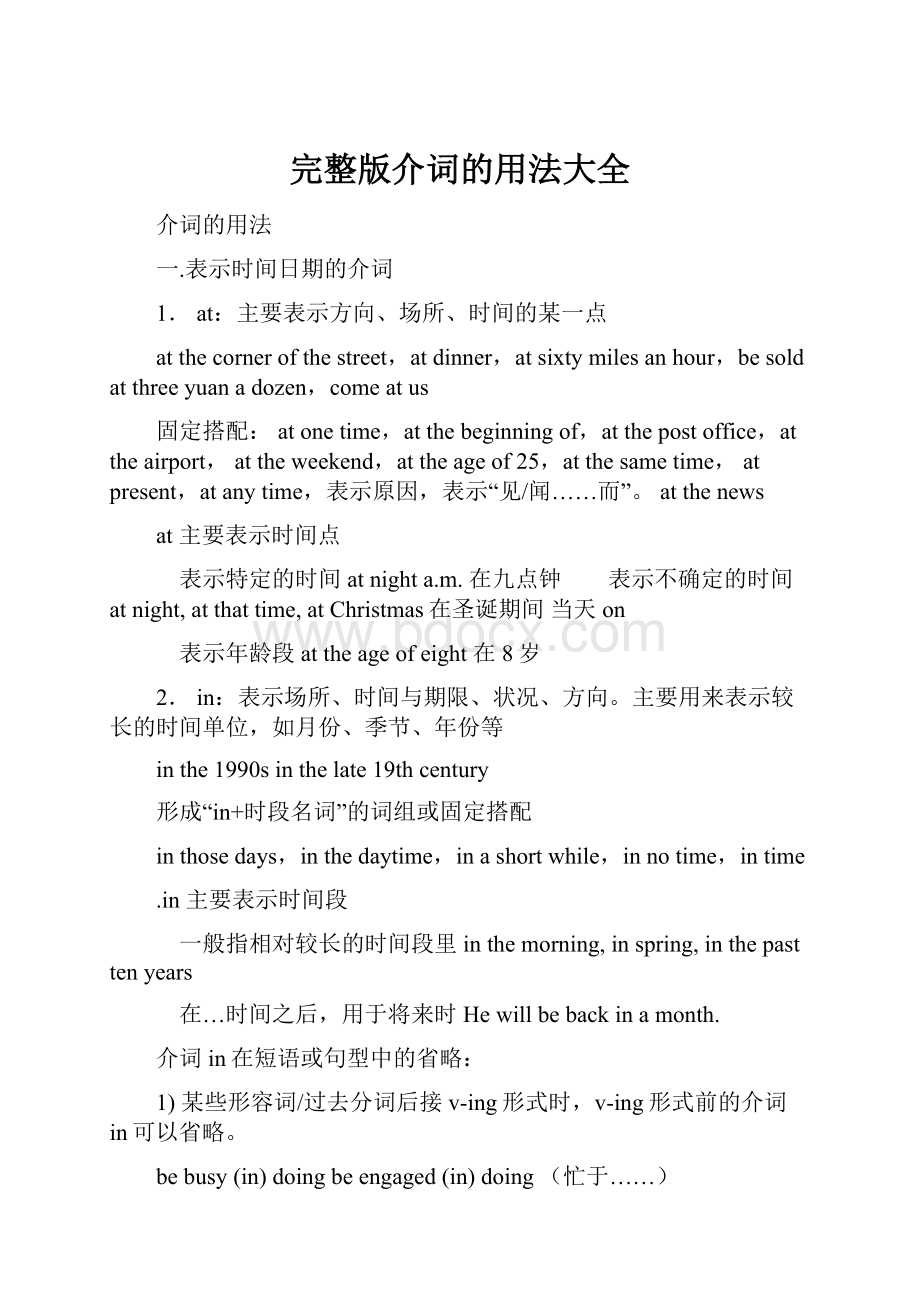完整版介词的用法大全.docx
《完整版介词的用法大全.docx》由会员分享,可在线阅读,更多相关《完整版介词的用法大全.docx(24页珍藏版)》请在冰豆网上搜索。

完整版介词的用法大全
介词的用法
一.表示时间日期的介词
1.at:
主要表示方向、场所、时间的某一点
atthecornerofthestreet,atdinner,atsixtymilesanhour,besoldatthreeyuanadozen,comeatus
固定搭配:
atonetime,atthebeginningof,atthepostoffice,attheairport,attheweekend,attheageof25,atthesametime,atpresent,atanytime,表示原因,表示“见/闻……而”。
atthenews
at主要表示时间点
表示特定的时间atnighta.m.在九点钟 表示不确定的时间atnight,atthattime,atChristmas在圣诞期间当天on
表示年龄段attheageofeight在8岁
2.in:
表示场所、时间与期限、状况、方向。
主要用来表示较长的时间单位,如月份、季节、年份等
inthe1990sinthelate19thcentury
形成“in+时段名词”的词组或固定搭配
inthosedays,inthedaytime,inashortwhile,innotime,intime
.in主要表示时间段
一般指相对较长的时间段里inthemorning,inspring,inthepasttenyears
在…时间之后,用于将来时Hewillbebackinamonth.
介词in在短语或句型中的省略:
1)某些形容词/过去分词后接v-ing形式时,v-ing形式前的介词in可以省略。
bebusy(in)doingbeengaged(in)doing(忙于……)
2)某些动词如busy等,常与反身代词连用,其后的in也可以省略。
busyoneself(in)doing
3)某些动词如spend、pass、waste等与表示时间的名词连用,后面的介词也可以省略。
spendtime(in)doingwastetime(in)doing
4)在havenodifficultyindoingsth.、havenotroubleindoingsth.、havenobusinessindoingsth.等句型中介词也可以省略。
5)在句型Thereisnouse(in)doingsth.中,介词也可省略。
固定搭配:
intheworld,in(the)future,inthesnow/rain/storm,inink,inshort,inpublic,inone’sopinion,inmoderntimes,insurprise,inaqueue,intheopenair
3.on:
主要表示在上面、根据或基础、有关或涉及的方面、表示某天。
固定搭配:
ondoingsth.,ontheafternoonofOctober,onTuesdayevening,onfoot,hitsb.onthehead,ontheright/left,onfire,onduty,onsale,ontheradio,onshow,onearth,onone’sown
注意:
一般带有宗教色彩的节日名词前面用at,如圣诞节。
一般的节日名词前用on。
on主要指具体某一天
表示是具体的日期和星期onMonday,onOctober1st,1949.onmybirthday
某一天特定的上午下午或半夜onthenightofDecember31,1999.onafineday
在第几天onherfirstdaytoschool,onthetenthdayIwasinBeijing.
4.by主要表示接近、时限、动作的执行者、方式。
固定搭配:
bythevillage,byoneself,byfoot(=onfoot),byhand,learn…byheart,
二.表示地点,方位的介词
5.for主要表示目的、原因、交换值以及时间和距离的长度。
固定搭配:
makesth.forsb.,thanksb.forsth.,forexample,forsale,forfree,
for表示一段时间
表示一件事延续的长短,一般接具体的时间IhavelivedinNanjingfor2years.
6.of表示部分与全体的关系、所有关系、来源和所用的材料。
of所有格表示的多种关系:
1)从属关系:
thewheelofthecar
2)局部----整体关系:
someofthewater
3)量化关系:
acupoftea
4)描述关系:
aprofessoroflearning(知识丰富的教授)
5)同位关系:
thecityofBeijing
6)动宾关系:
thestudyofthemap(研究地图)
7)主谓关系:
thedeterminationoftheworkers(工人们的决心)
固定搭配:
befondof,makefunof,betiredof,ofone’sown,insteadof,
7.to主要表示方向、程度、结果、关系和位置。
固定搭配toone’ssurprise/joy/astonishment,totheeastof,keyto…,comeupto,addupto,beopentothepublic,thanksto,stickto,referto
8.during表示一段时间
在…期间内,强调在此期间内发生了什么事y
Istudiedinthisuniversityfor4years,duringthattimemostofmytimewasspentinlearningEnglish.
可接表示时间延续一段时间的名词duringmyvisittoChina,duringmyholiday
9.from与to,till连用
Mostpeopleworkfromninetofive.多数人过着朝九晚五的生活
10.since,since+时间点从那一刻起,与现在完成与过去完成时连用
HehasbeenheresincelastSunday.自从上星期天起,她就在这里
四、容易错、常考的介词及搭配
1.bemadeof,bemadefrom,bemadeinto,bemadein
2.callon=visit,callfor=goandpickup
3.onbusiness(出差)/strike()罢工/duty(值日)/holiday/fire/vacation/watch(警戒)/sale(出售)/leave(请假)/guard(警戒)
4.havesometrouble/difficulty(in)doingsth.,haveahabit/idea/planofdoingsth.
5.AispleasedtoB,BispleasedwithA(对……感到满意)
7.withthehelpof,undertheleadershipof
8.bymeansof(使用),bywayof(经由),byheart(记住),bytheway
9.outofquestion(毫无疑问),outofthequestion(毫不可能)
10.prevent/stop/keepsb.fromdoingsth.
11.bethankfultosb.forsth.
12.stealsth.fromsb.,robsb.ofsth.
13.insistondoingsth.,persistindoingsth.,stickto,goondoingsth.
14.setaboutdoingsth.,setouttodosth.
15.looksb.intheface,hitsb.ontheface,leadthecowbythenose
16.doafavourforsb.=dosb.afavour
五、介词的惯用型
1.aboveall(首先),afterall,atall(全然),inall
2.dayafterday,yearafteryear,oneafterone,oneafteranother
3.atpeace(和平),atwar(战争),attimes(时常),atdinner
4.byoneself,byallmeans(尽一切办法、务必),bychance,byaccident,
bynomeans(决不、并没有),bymeansof(用、依靠),bytheway
5.inherteens(十几岁),inpain,indanger,inneed
6.toone’sjoy/sorrow/surprise
7.withcare(仔细地),withjoy/pleasure(高兴地),withone’shelp,
withthebestwishes(致以我们良好的祝愿),withoutdifficulty(毫不困难地),withoutexception(毫不例外),withoutdelay(立即、马上)
8.accordingto(依据),alongwith(和……一起),asto(至于……),becauseof,exceptfor(除……之外),insteadof(代替)
9.outoforder(不正常),outofdate,outoftrouble(脱离困境),outofsight,
outofdebt(还清了债务),outoftouch(没有联系)
10.atthebottomof,atthecentreof,attheendof,atthetopof,
atthecostof(以……为代价)atthesightof,atthethoughtof,ataspeedof
11.inmemoryof(纪念),infavourof(同意),inthehabitof(有……习惯),intouchwith(与……保持联系),ontheleftof,ontheeveof(在……前夕)
12.fromtimetotime(不时地),fromdaytoday(天天),fromhandtohand(一个传一个),fromsidetoside(左右地),fromcartocar(一个车厢一个车厢地),frombadtoworse(越来越差),frombeginningtoend(从头到尾),fromhandtomouth(仅能糊口),fromheadtofoot,fromstarttofinish,fromonetoanother
六.掌握方式、手段、工具的表达方法
1)in+文字、语言、材料名词
inEnglish(ink,pencil,capitalletters)writeinpen,用钢笔写speakinalowvoice小声说话
2)with+工具、机器;人体器官;情绪、情感、态度的名词
withabranch,withone’snose,withpride,withsatisfaction,
withthehelpof,withone’spermission
Wecanseewithoureyesandwritewithourhands.
Ikilledaflywithaflyflap.我用苍蝇拍打死了一只苍蝇
3)by表示泛指的方式、手段
bybus,byland,bymeansof(用……方法),bywayof(经由),bydoingsth.,
byhand(手工),bypost(由邮局传递),byletter(用写信的方式),byelectricity,byhardwork,bytheyear,bythehour(by+the+单位名词)按……
4)其它表示方式(情况、状况、手段)的表示法
throughtheradio/byradio/ontheradio,through/by/frompractice,
bytelephone(onthetelephone),onfoot,onthetrain,insatisfaction,insurprise,insilence,inalowvoice,incomfort,insorrow,inhigh/good/poorspirits,
inanger,insafety,indebt,ingoodorder,ingood/poorhealth,intears,
inuse,inpain,
七、注意:
某些名词和介词的固定搭配
1)要求to:
key,answer,visit,apology,introduction
以to为中心构成短语的归纳
belongto,cometo(苏醒),lookforwardto,leadto,stickto,referto,turnto, drinkto(为……干杯),objectto(反对),replytotheletter,helponeselfto, sing/dancetothemusic(和着……在……声中唱/跳),devoteoneselfto
2)要求in:
interest,satisfaction
3)以for为中心构成短语的归纳
askfor,callfor(去接某人),carefor(关心),goinfor(从事),answerfor(对……负责),sendfor,payfor,praisesb.for(赞扬某人某事),headfor(向……方向移动),searchfor,take…for…(误以为),leavefor,preparefor(为……准备),thanksb.for,makeadivefor(向……猛冲),makeupfor(弥补……损失)
4)以on为中心构成短语的归纳
comeon来吧,callon拜访,passon传递,carryon进行下去,liveonsth.靠……生活,dependon依靠,haveon穿着,havepityon同情,lookon…as…把……看作, pushon推动,spyon窥探,switch/turnon旋开,waiton服侍,walkon继续走,spend…on…在……上花费时间、金钱,operateon给……动手术, takeonanewlook呈现新面貌
八、某些形容词和介词的固定搭配
1)beafraidof担心beafraidfor替……而担心
2)beangryabout/atsth.因……而生气beangrywithsb.对……某人发怒
3)beanxiousforsth.渴望beanxiousaboutsth./sb.担心
4)bedifferentfrom与……不同beindifferentto………不关心
5)begoodat…擅长begoodfor…对……有益begoodofsb.todosth.友好
6)bestrictwithsb.对……严格bestrictinsth.
7)bepopularwithsb.受到……欢迎bepopularinsomeplace流行在……bepopularfor因……而流行
8)bepleasedwith+n.或what从句;bepleasedat+抽象名词听、看到而高兴
9)bedisappointedatsth.;bedisappointedwithsb.对……失望
10)beknowntosb.;beknownwith+n.或从句;beknownfor因……而著名
11)beabsentfrom缺席
12)bedevotedto…献身于……
13)beopento…对……开放
14)bepoor/clever/expertat…
15)besorryfor…替/为……后悔
16)berichin…beinterestedin…
17)beproudof(takepridein)
18)besatisfiedwith/by…besureof/about…
19)befondof,befitfor,bebusywithsth.(indoingsth.)
20)belatefor,bereadyfor
21)besimilarto…;bewrongwith…
九、吊尾介词
1)某些形容词后接不及物动词或“V+介”型短语动词的不定式形式表“反射”,常用吊尾介词。
A)fit,easy,hard,good,difficult,comfortable,heavy等形容后,常用吊尾介词。
e.g.Thegirliseasytogetalongwith.
B)beworthdoing,beworthyofbeingdone,beworthytobedone,want/require/needdoing表反射,常用吊尾介词。
e.g.Theproblemisworthdealingwith.
Thebookisworthyofbeingreferredto.
2)不及物动词的不定式修饰表“涉及对象、场所、工具、手段、方式、材料等”意义的名词时常带吊尾介词。
e.g.Thereisnothingforustoworryabout.aroomtolivein
3)定语从句中,先行词被一个不及物动词所修饰,则不及物动词后要带介词,先行词被“V+介”组成的短语动词所修饰,介词常在句尾。
e.g.HeistheverymanIjustspoketo.Thisisthelifeheisusedto.
4)以what,whose,who,whatever等引导的宾语从句、表语从句中常出现“吊尾介词”。
e.g.Idon’tknowwhatyoudoitfor.
5)强调句型和特殊疑问句中由于被强调部分和疑问词位置变更,常出现吊尾介词。
在上下文意义清楚时,特殊疑问句常用省简结构。
e.g.Itisthepoorboythatwegavethebooksto.
Whatfor?
(为什么?
)Whereto?
(去哪儿?
)Whowith?
(和谁去?
)
6)被动语态中“V+介”短语常用吊尾介词。
e.g.Hewaslistenedtocomehere.Hehasneverbeenspokentointhisway.
十常用介词辨异
1.about,on,of关于
on多用于慎重的、正式的语言交际场合。
常见于“学术上”的“论文”或“演说”等题目,可供专门研究这一问题的人阅读,有“论及”之意。
about表示的内容多为普遍、不那么正式,有“述及”之意。
of作“关于”讲,表示提及、涉及某人(事)时,只表示事情存在或发生,并不涉及详情;有时与about意义相近,但有时意义很不同,常与动词know、hear、learn(听说)、speak、talk、think、tell等连用。
2. at, on, in(表时间):
at表示时间的一点;in表示一个时期;on表示特殊日子
A.at后常接几点几分,天明,中午,日出,日落,开始等。
如:
at five o’clock (五点),at down (黎明),at daybreak (天亮),at sunrise (日出),at noon (中午),at sunset (日落),at midnight (半夜),at the beginning of the month (月初), at that time (那时),at that moment (那会儿),at this time of day (在一天的这个时候)。
B. in后常接年,月,日期,上午,下午,晚上,白天,季节,世纪等。
如:
in 2006(2006年),in May,2004 (2004年五月),in the morning (早晨/上午),in the afternoon (下午),in the evening (晚上),in the night (夜晚),in the daytime (白天),in the 21st century (21世纪),in three days (weeks/month)三天(周/个月),in a week (一周),in spring (春季)。
C. on后跟某日,星期几,某日的朝夕,节日等,即具体某一天极其早\中、晚.
on Sunday (星期日),on a warm morning in April (四月的一个温暖的上午),on a December night (12月的一个夜晚),on that afternoon (那天下午),on the following night (下一个晚上),on Christmas afternoon (圣诞节下午),on October